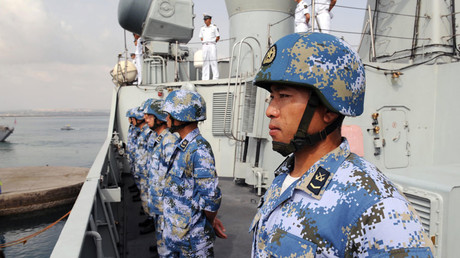Tillerson pits Beijing’s ‘predatory’ Africa expansion against Washington’s ‘responsible’ support
China’s rapidly growing influence on the African continent is worrying the US Secretary of State. He claims that its investments are detrimental, unlike Washington’s “responsible” promotion of the “rule of law.”
The Chinese approach to relations with the African countries “encourages dependency” through the use of “opaque contracts, predatory loan practices, and corrupt deals that mire [the African] nations in debt and undercut their sovereignty,” Rex Tillerson stated in his speech at the George Mason University, Fairfax, Virginia, on Tuesday, ahead of his official trip to Africa. He claimed that China’s approach “stands in stark contrast” to the good intentions of the US.
Even though the top US diplomat admitted that “Chinese investment does have the potential to address Africa’s infrastructure gap,” he still argued that it eventually would only lead to “mounting debt” for the African nations and would create only “few, if any, jobs in most countries.” He also claimed that China “endangers Africa’s natural resources and its long-term economic political stability.”
The US approach, on the contrary, “develops sustainable growth that bolsters institutions [and] strengthens rule of law,” Tillerson claimed. He went on to encourage China to join the US in “responsible” development efforts based on “transparent market practices,” thus effectively urging it to switch to a model of relations with the African countries that has been developed and championed by the West.
While attacking Beijing over its growing interests in Africa, the US Secretary of State grabbed the opportunity to boast about Washington allocating $533 million in “additional humanitarian assistance to fight famine and food insecurity” in such countries as Somalia, South Sudan and Ethiopia, as well as in the region of the Lake Chad basin. “The US is the largest provider of humanitarian assistance,” Tillerson stated.
The US might indeed still be the largest aid donor in Africa as well as the largest investor. However, Beijing is rapidly catching up with Washington in many other areas of relations with African nations, and even surpasses it when it comes to trade or job creation. Such a situation pits the two powers against each other in what seems to be a contest for influence on the continent.
Booming trade has made China Africa’s biggest trade partner in less than two decades. In 2000, trade volume between China and the African nations accounted for mere $10 billion. It grew by a factor of 20 in 15 years and reached its peak of over $200bn in 2015, according to the IMF. Even though China’s trade volume with the African countries has shrunk since that time by roughly a quarter, it still far outshines that of the US, which has been almost steadily decreasing since 2012, and amounted to less than $50bn by 2017.
China has also become the largest jobs creator on the continent, according to a 2017 report issued by the Ernst & Young multinational professional services firm. The same report also said that Beijing’s foreign direct investment (FDI) increased by 106 percent over 2016, making it the third largest investor in Africa. Since 2005, China has invested in 293 FDI projects in Africa and created more than 130,000 jobs.
Beijing does not just invest in Africa, it also actively funds major infrastructure projects on the continent, thus winning the hearts of the local population. China has “aided or financed the building of over 5,000km of railway and roads, built more than 200 schools and nearly 100 hospitals, and trained more than 160,000 professional workers in Africa,” the Chinese ambassador to the UK, Liu Xiaoming, wrote in an article for the Telegraph in December 2017.
What could also be worrying for the US is that Beijing does not only engage in Africa economically but also actively promotes its own culture, language and governance experience among the African nations.
Beijing has opened over 40 language and culture centers in Africa. It also managed to drastically increase the number of African students studying in China in recent years. In 2003, their number amounted to just 2,000 while, in 2015, it reached almost 50,000. According to Quartz, China effectively became the most popular destination for Anglophone African students studying abroad, surpassing the US and the UK.
Apart from that, China also started playing an increasing role in educating African elites. Between 2011 and 2015, some 200 African politicians went to China for training. In 2016, Beijing said it would invite as many as 1,000. Such a complex policy has already yielded some results.
The Chinese economic model of development was becoming increasingly popular among the African nations, according to the 2016 Afrobarometer survey. The poll, conducted among 56,000 people from 36 African countries, showed that the Chinese model was considered to be roughly as good as the US one by Southern African and Northern African nations. People living in Central Africa saw it as even more preferable.
Think your friends would be interested? Share this story!







Comments are closed.